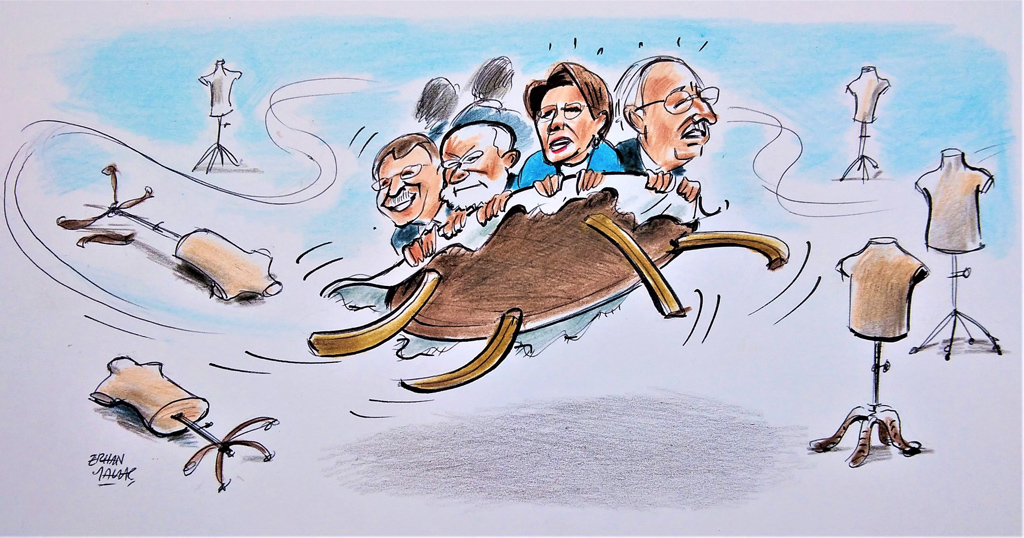Since the debate over the opposition’s joint presidential candidate is showing no signs of abating, one cannot help but address the issue anew. Most recently, the names of Mansur Yavaş, the mayor of Ankara, and Haşim Kılıç, a former chief justice of the Constitutional Court, came up. In truth, the six opposition parties have a clear position. The main opposition Republican People’s Party (CHP) and others frequently state that they will jointly endorse a single candidate and argue that there is enough time to reach that goal.
Ironically, though, it is the opposition itself that gives momentum to that debate for various reasons. The fateful question – “who will be the candidate?” – is being asked by supporters of presidential hopefuls, the pro-opposition media and opposition parties that do not have a seat at the table. Indeed, the CHP chairperson, Kemal Kılıçdaroğlu, pushed back, asking why people kept asking about the opposition’s candidate “provided that (President Recep Tayyip) Erdoğan hasn’t announced his candidacy yet,” just because he cannot actually tell people to stop asking.
Erdoğan’s stance
I agree, too, that there is no reason to expect the opposition to identify its candidate(s) before the campaign starts. Whether that decision is informed by the concern that their candidate would become vulnerable to attacks or the inclination to answer the most difficult question later rather than sooner, the opposition seems to prefer to wait until the campaign period.
It is also significant that Erdoğan does not talk about the election and maintains that the vote is still 14 months away. Indeed, the opposition leaders have repeatedly “announced” the date for early elections, but Erdoğan insisted that the election will take place as scheduled. Instead, he focused on completing megaprojects and the diplomatic front. In other words, Erdoğan treated the race like a marathon, concentrating on his plans. Yet the dynamic nature of domestic politics and foreign policy brings the opposition back to the election and they cannot stop talking about potential candidates.
For example, Viktor Orban’s victory against the alliance of six opposition parties in Hungary appears to have unnerved the Turkish opposition. Kılıçdaroğlu attempts to reassure everyone by saying that Hungary is vastly different from Turkey, but the commentators are compelled to write about the lessons to be learned from that election. They call on the opposition not to “downplay” the Hungarian election, warning that next year’s election could “lead to disappointment” as well, and stress that it is not enough to come together or even jointly endorse a single presidential candidate. As such, they argue that the opposition must develop and internalize a common platform and vision. For the record, none of those warnings are unprecedented.
Division is still present
The debate over Hungary demonstrated yet again that the opposition remains divided regarding the timing of the joint presidential candidate’s announcement. Some of them demand that an exciting champion be fielded without delay, arguing that the opposition needs to make that move to communicate with the relevant voter blocs. Others, in turn, believe that the priority must be to identify certain principles, develop a platform and even clarify the transition process. In their view, the joint candidate will be named by the six party leaders anyway – so the prospective candidate will operate within the limits set at the negotiating table. That, too, is a question of methodology and preference.
There are, however, several challenges that the potential candidate must overcome: The new international order ushered in by the coronavirus pandemic and the Russia-Ukraine war. Great power competition and the increasingly entrenched Cold War atmosphere highlight the importance of issues like food, energy, security and stability in the public eye. In this sense, Erdoğan, who demonstrates strong leadership, pursues a policy that looks out for Turkish interests and contributes to world peace within the Ukraine crisis context. Again, the Turkish president pursues normalization with the United States and the European Union, which have become more aware of Turkey’s strategic importance. That approach has started to pay off, as some Western nations have lifted sanctions on Turkey’s defense industry.
Another card loses its power
Under the current circumstances, it seems unlikely for the opposition to successfully portray the government as anti-Western. Again, the charge of “authoritarianism” and the push for a “transition to parliamentarism” have little meaning. In this sense, the latest geopolitical developments limit, rather than expand, the opposition’s room for maneuver. Furthermore, treating Erdoğan’s removal as a “question of national survival” could cause more problems for the opposition vis-a-vis the electorate.
Finally, a message to those commentators attempting to offer guidance to the opposition: The idea that Erdoğan is a “populist leader” is nothing more than something that the opposition has memorized. It is a source of weakness because that assumption always causes the opposition to realize belatedly what tricks Erdoğan has up his sleeves.
In this article
- Opinion
- 14 May 2023 Turkish General Election
- 2023 Turkish General Elections Presidential Candidates
- 2023 Turkish Presidential Election
- 24 February 2022 | Russian invasion of Ukraine
- Cold War
- Daily Sabah
- Ekrem Imamoğlu
- Haşim Kılıç
- Hungary
- Mansur Yavaş
- Nation Alliance
- Normalization
- Recep Tayyip Erdoğan
- Russia-Ukraine War
- Turkish Opposition
- Turkish President
- Türkiye
- Türkiye's 2023 Elections
- Türkiye's Democracy and Progress Party (DEVA)
- Türkiye's Felicity Party (SP)
- Türkiye's Future Party (GP)
- Türkiye's Good Party (IP)
- Türkiye's Opposition
- Türkiye's Republican People's Party (CHP)
- Viktor Orban

